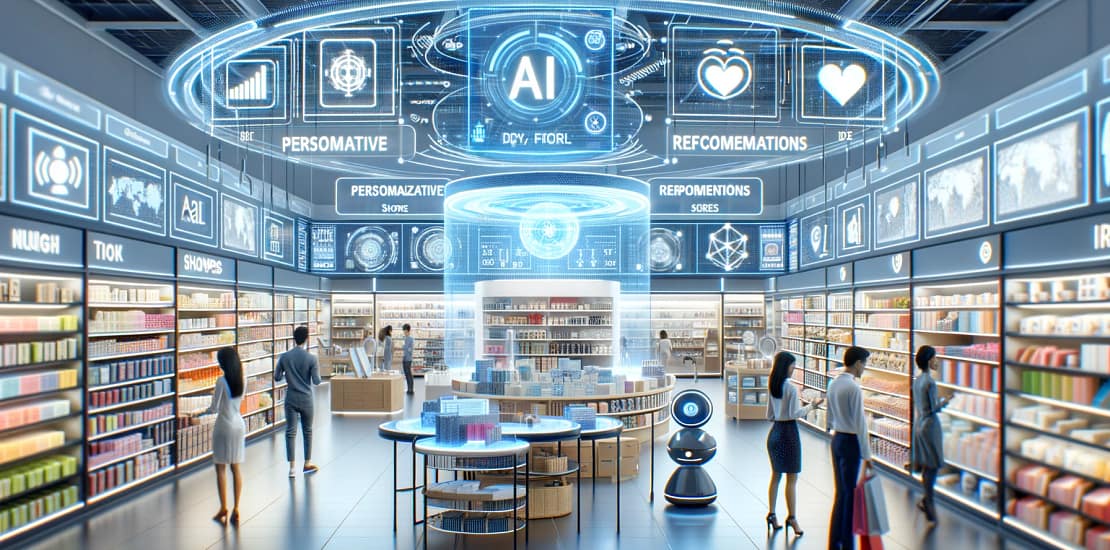Revolutionizing Retail: Successful AI Projects That Are Changing the Game
- November 16, 2023
- Posted by: Cheryl Li
- Category: Case Studies

The retail sector stands at the forefront of digital transformation, with Artificial Intelligence (AI) playing a pivotal role in reshaping the landscape. From personalized shopping experiences to efficient supply chain management, AI’s impact on retail is profound and far-reaching. This blog post explores a selection of successful AI projects in the retail industry, showcasing how innovative applications of AI are driving efficiency, enhancing customer satisfaction, and revolutionizing business models.
Personalization at Scale
One of the most notable successes of AI in retail is the ability to personalize the customer experience at scale. E-commerce giants like Amazon have set a high standard with their AI-driven recommendation engines, which analyze customer data, including past purchases, search history, and browsing behavior, to suggest products tailored to individual preferences. Such personalization enhances customer involvement and fidelity, resulting in increased conversion rates and recurring transactions.
Streamlining Inventory Management
AI is also transforming inventory management, making it more efficient and responsive. Retailers like Walmart are leveraging AI to predict demand for products at different times and locations, optimizing stock levels and reducing the risk of overstocking or stockouts. By analyzing sales data, weather forecasts, and trending social media topics, AI algorithms can forecast demand with remarkable accuracy, ensuring that shelves are stocked with the right products at the right time.
Enhancing Customer Service with Chatbots
AI-powered chatbots are revolutionizing customer service in retail by providing instant, 24/7 assistance. These chatbots can handle a wide range of queries, from tracking orders to answering product-related questions, freeing up human customer service representatives to deal with more complex issues. Retailers like Sephora and H&M have successfully implemented chatbots to improve customer engagement and provide a seamless shopping experience, both online and in-store.
Optimizing Supply Chain Operations
AI’s impact on supply chain operations is another game-changer for the retail industry. By analyzing data from various sources, including suppliers, warehouses, and transportation systems, AI can identify inefficiencies and suggest optimizations. For example, AI can recommend the most efficient routes for delivery trucks, predict potential disruptions, and suggest contingency plans. This not only reduces operational costs but also improves the speed and reliability of deliveries.
Dynamic Pricing Strategies
Dynamic pricing is yet another area where AI is making significant strides in retail. By analyzing factors such as demand, competitor pricing, and market trends, AI algorithms can adjust product prices in real-time to maximize sales and profits. This approach is particularly effective in highly competitive markets or for products with short life cycles, such as fashion or electronics. Retailers like Amazon and airlines have been pioneers in adopting dynamic pricing strategies, significantly boosting their bottom lines.
In-Store Experience and Analytics
Brick-and-mortar retailers are using AI to enhance the in-store experience and gather valuable insights. For instance, smart mirrors in fitting rooms can suggest clothing items to customers based on their current selections, increasing cross-selling opportunities. AI-powered analytics can also track customer movements and interactions within the store, providing data on popular products and areas. This information can guide layout changes, product placements, and promotional strategies to maximize sales and improve the customer experience.
Fraud Detection and Prevention

Fraud detection and prevention is another critical area where AI is making a significant impact in retail. By analyzing transaction data in real-time, AI systems can identify patterns indicative of fraudulent activity, such as unusual purchasing behavior or mismatched shipping information. This allows retailers to flag suspicious transactions for further review, reducing losses due to fraud and enhancing the security of online transactions.
Sustainable Practices and Waste Reduction
AI is also contributing to sustainability in the retail sector by optimizing operations and reducing waste. For example, AI can forecast demand more accurately, leading to more efficient production and distribution processes that minimize overproduction and waste. AI-driven systems can also optimize energy use in stores and warehouses, contributing to environmental sustainability efforts.
The Road Ahead
The successful AI projects highlighted in this blog post represent just the tip of the iceberg in terms of AI’s potential in the retail industry. As technology continues to evolve, we can expect even more innovative applications of AI that will further transform the retail landscape. The key to success lies in the strategic implementation of AI, with a focus on enhancing customer experiences, optimizing operations, and driving sustainable practices.
Conclusion
AI is revolutionizing the retail industry, driving efficiencies, enhancing customer experiences, and paving the way for innovative business models. The successful AI projects in personalization, inventory management, customer service, supply chain optimization, dynamic pricing, in-store analytics, fraud prevention, and sustainability are testament to AI’s transformative potential. As retailers continue to embrace AI, the sector is set to become more responsive, customer-centric, and sustainable, heralding a new era of retail that leverages technology to meet the evolving needs of consumers and the planet.

